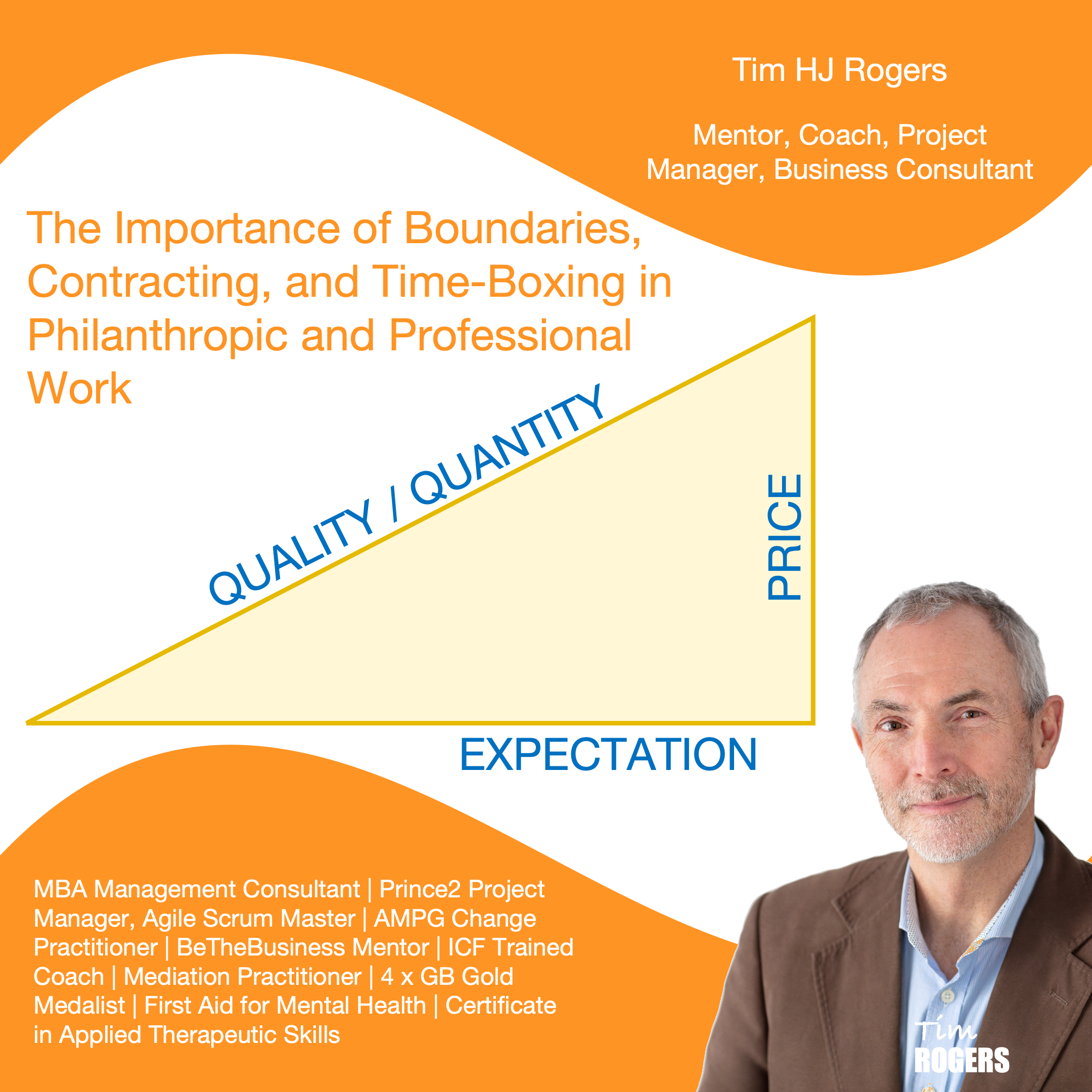The Importance of Boundaries, Contracting, and Time-Boxing in Philanthropic and Professional Work

One of the habits I’ve developed over time is stepping in to help struggling organizations, whether they’re charities, startups, or businesses. With my background as a consultant, coach, and project manager, I’ve often found myself in a position to offer valuable support—whether it’s advice, strategic guidance, or even hands-on execution. Many of these organizations need help but may lack the staff, funding, or time to implement necessary changes, leaving them in a constant state of firefighting.
When organizations are in survival mode, it’s hard for them to prioritize the improvements that can lead to better productivity, performance, or profitability. The challenge is that while they may need help, they often aren’t in a position to compensate for the support they receive. While this is understandable in the charitable sector, it becomes more complex when you’re offering free support to commercial businesses or even government agencies.
Understanding the Value of Your Work
A friend of mine once gave me a piece of advice that really resonated: “Don’t do anything for nothing unless it’s a charity. Even if you feel compelled to help for free, get paid and donate the money if you don’t need it.” The reason is simple: when people don’t pay for something, they often don’t value it, and doing work for free can lead to a dynamic where your contribution is undervalued or taken for granted. This insight has shaped how I approach helping organizations, balancing my desire to support with the need to maintain fairness and professional integrity.
Setting Boundaries
One of the most important lessons I’ve learned is the necessity of setting clear boundaries. Boundaries help define what you will and won’t do, and they are crucial in distinguishing between offering advice and becoming responsible for implementation. When you step in to help, it’s essential to clarify whether the organization needs a few minutes of guidance or if they expect you to take over the task entirely.
Boundaries also clarify roles—who is responsible, accountable, consulted, and informed. Even if you are offering your support, it’s critical that the organization’s leadership retains responsibility for the outcomes. Whether you’re a volunteer, advisor, consultant, or coach, the people running the organization must not absolve themselves of their duties. This is particularly important when the work is voluntary and unpaid. Clear boundaries ensure that your role remains advisory and supportive, rather than allowing the responsibility to shift unfairly onto your shoulders.
Contracting: Setting Clear Expectations
Contracting is about defining the ways of working. It’s related to boundaries, but more focused on the “how” rather than the “what.” In commercial engagements, contracts or statements of work typically outline what is being delivered, at what price, and under what conditions. When working in more informal or philanthropic contexts, it’s still important to be clear about expectations. What are the deliverables, and under what conditions will they be provided?
It’s crucial to differentiate between different levels of service—whether you’re offering something as a free taste, a pilot, or a fully paid, fully functional solution. Often, organizations expect full services for free, and this is where clarity is key. Establish a linear progression of expectations—what’s offered for free and what requires payment. This not only manages expectations but also protects your time and resources.
Time-Boxing: Protecting Your Time and Effort
Time-boxing is another effective way to manage your contributions. Just as you might donate a certain amount of money to a charity, you can donate a set amount of time—say, 20, 40, or 60 hours—to an organization. They can then allocate that time as they see fit, much like they would with a financial donation. This approach gives them flexibility while also protecting you from overcommitting.
You can also create a blended approach: donate a certain number of hours upfront, but make it clear that additional time will be chargeable at a specific rate. Alternatively, offer to donate time for specific tasks but charge for work outside that scope. Time-boxing helps set expectations from the start, ensuring that your support remains manageable and fair for both parties.
The Power of Clear Communication
Entering any professional relationship—whether philanthropic or commercial—requires clear communication around boundaries, contracting, and time. This ensures mutual understanding and prevents misunderstandings. Without these conversations, there’s a risk of over-reliance on unpaid work or unrealistic expectations around compensation.
It’s natural to feel hesitant about setting these boundaries. Many of us are inclined to be generous and want to help, but if you don’t establish the rules upfront, you can end up feeling taken advantage of. And when that happens, it’s not the organization’s fault; it’s the result of unclear communication and unmet expectations on both sides.
Conclusion: Balancing Generosity with Professional Integrity
Helping others is rewarding, but it’s important to protect your time, energy, and value. By setting boundaries, clearly contracting your services, and time-boxing your efforts, you can ensure that both you and the organizations you support benefit from the relationship. In the end, these tools aren’t just about protecting yourself—they also help organizations understand the value of the support they’re receiving and foster more sustainable, mutually respectful partnerships.
#Leadership #Consulting #Boundaries #TimeManagement #CharityWork #BusinessAdvice #ProfessionalDevelopment #Productivity #Philanthropy #WorkLifeBalance
